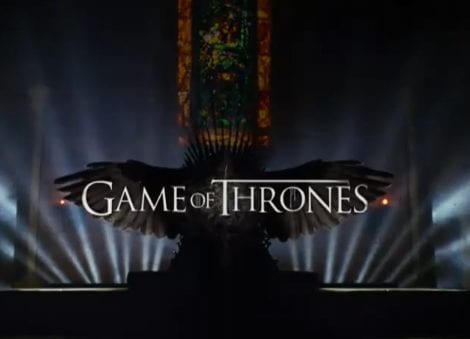
“Game of Thrones” is the story of a power struggle in a feudal society, filled with political intrigue, betrayal, violence, moral ambiguity, and character drama.
You wouldn’t know this if you’d read the vast majority of the media feedback on the show, however.
No, if all you knew about “Game of Thrones” came from reviews and entertainment news outlets, you would think that “Game of Thrones” is about boobs. Lots and lots of boobs.
Boobs.
Boobs on naked women. Boobs on semi-naked women. Boobs on women having sex. Boobs on women getting dressed. Boobs on women getting undressed. Boobs.
Tired of that topic yet? Yeah, exactly. That’s probably how a“Game of Thrones” fan reading reviews of the show feels too: entertainment news and the blogosphere can’t seem to keep from hyper-focusing on the show’s ample nudity and sex.
And believe you me: There is a lot of nudity and sex in “Game of Thrones.”
No one is disputing that. The problem is that people are choosing to focus on the mature content at the expense of the show’s other redeeming qualities. Worse still, the nudity and sex is being touted as a hugely offensive, negative part of the show… instead of, say, the equally humongous amounts of graphic violence.
According to entertainment news, we are apparently living in a world where suggestiveness is way, way worse than violence and abuse. It’s a world where a scene in which Margaery Tyrell willingly disrobes (boobs!) is so awful it must be commented upon incessantly, but the sight of Eddard Stark’s decapitated head stuck on a pike is not worth mentioning.
This discrepancy has become so obvious that 9Gag.com has created a chart documenting the amount of nudity per episode. A chart depicting deaths or violent acts, however, has yet to be created. Apparently it isn’t as worth talking about as all of the boobs.
The subject of nakedness in “Game of Thrones” has become so pervasive that reviewers are taking special note of when it’s not included in an episode, as in this article from Wired. It’s a subject for intense journalistic discourse, requiring both opponents and defenders, and it’s been parodied by SNL.
Leading lady Emilia Clarke, who plays Daenerys Targaryen, can’t even get through a single interview or profile without someone asking her about what she thinks of being unclothed so often on the show. Exhibits A, B, and C. Of less note, apparently, is her character’s emotionally and sexually abusive relationship with her brother, or the violence done on her behalf and by her orders.
Last year we covered NYT reporter Ginia Bellafonte’s woefully condescending and point-missing early review of “Game of Thrones,” in which she, too, commented on the provocativeness as a point against the show. Her point seemed to be that the target demographic was obsessed with boobs, yet she herself failed to note what the story is actually about.
If anyone is “obsessed” with boobs, it’s not the audience: it’s the apparently puritanical reviewers.
The trend of clutching one’s journalistic pearls over the sight of nudity in “Game of Thrones” is disturbing on a number of levels.
First, sex and nudity are a pretty natural part of life and relationships, a fact that shouldn’t shock most of the TV-viewing public. Beheadings, impalings, torture, executions, brutal maiming, fights to the death, and brawls on the other hand, are not part of daily life, nor should they be. The fact that the graphic violence of “Game of Thrones” is somehow more acceptable to reviewers and bloggers than the sight of Daenerys Targaryen’s breasts is rather… well, backward.
It’s hypocritical and frankly weird that this aspect of “Game of Thrones” has incited a more negative reaction than the violence and death. Not that there’s anything wrong with the violence in “Game of Thrones,” either, it’s just… where are our priorities?
If we’re waving our arms around in outrage over nudity, shouting “Think of the children!”, shouldn’t we be more upset by the exposure to grisly deaths and violence than the very normal and benign sight of the naked human body?
It probably says much more about our society’s outlook on human sexuality—and female sexuality, in particular—than it does about the show’s “gratuitous” use of it.
Perhaps the show’s focus on sexuality matter of taste. After all, much of it is plot-related, and the show would suffer for its exclusion. The very first episode of season one ends with a young child being hurled from a tower after peering in on an incestuous (twincestuous?), adulterous coupling that he was never meant to see. That scene shapes the beginning of the conflict between two major houses, and reveals the secret that will eventually start a war.
Then again, there’s also Esme Bianco’s Ros, a character invented for the show (she doesn’t appear in the books, though she does replace a few prostitutes from the novels) as a vehicle of exposition. Purists might say that the busty redhead (who spends a great deal of time in her birthday suit) is not essential to the plot, and is an unnecessary distraction, even if she clarifies plot points through dialogue.
Matters of personal taste aside: is there truly anything wrong with including salacious material in the show, whether or not it was explicitly shown or even implied in the books?
No. There’s not. There’s really not, and viewers or reviewers who are offended might just need to kindly grow the hell up.


Leave a Reply